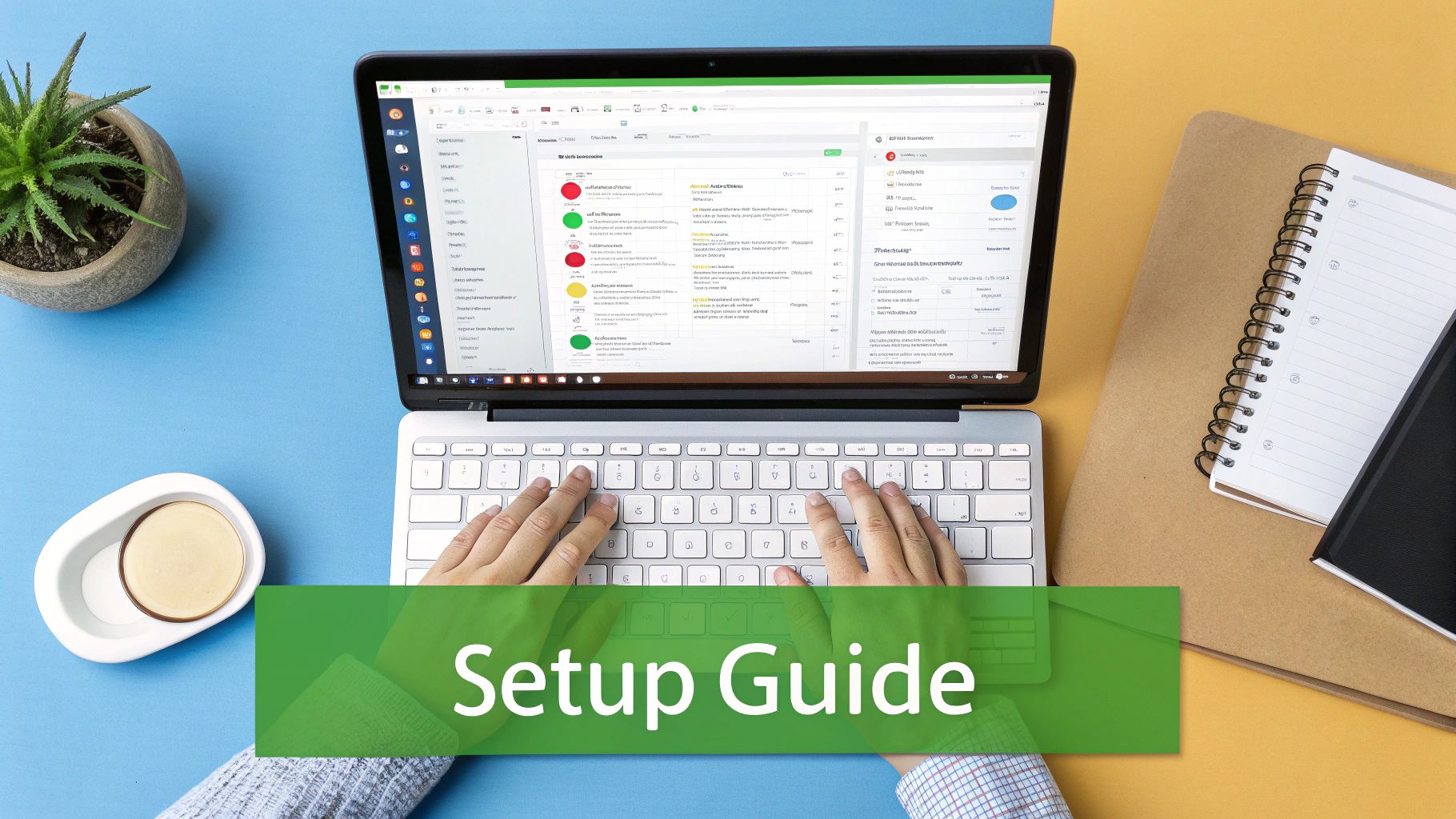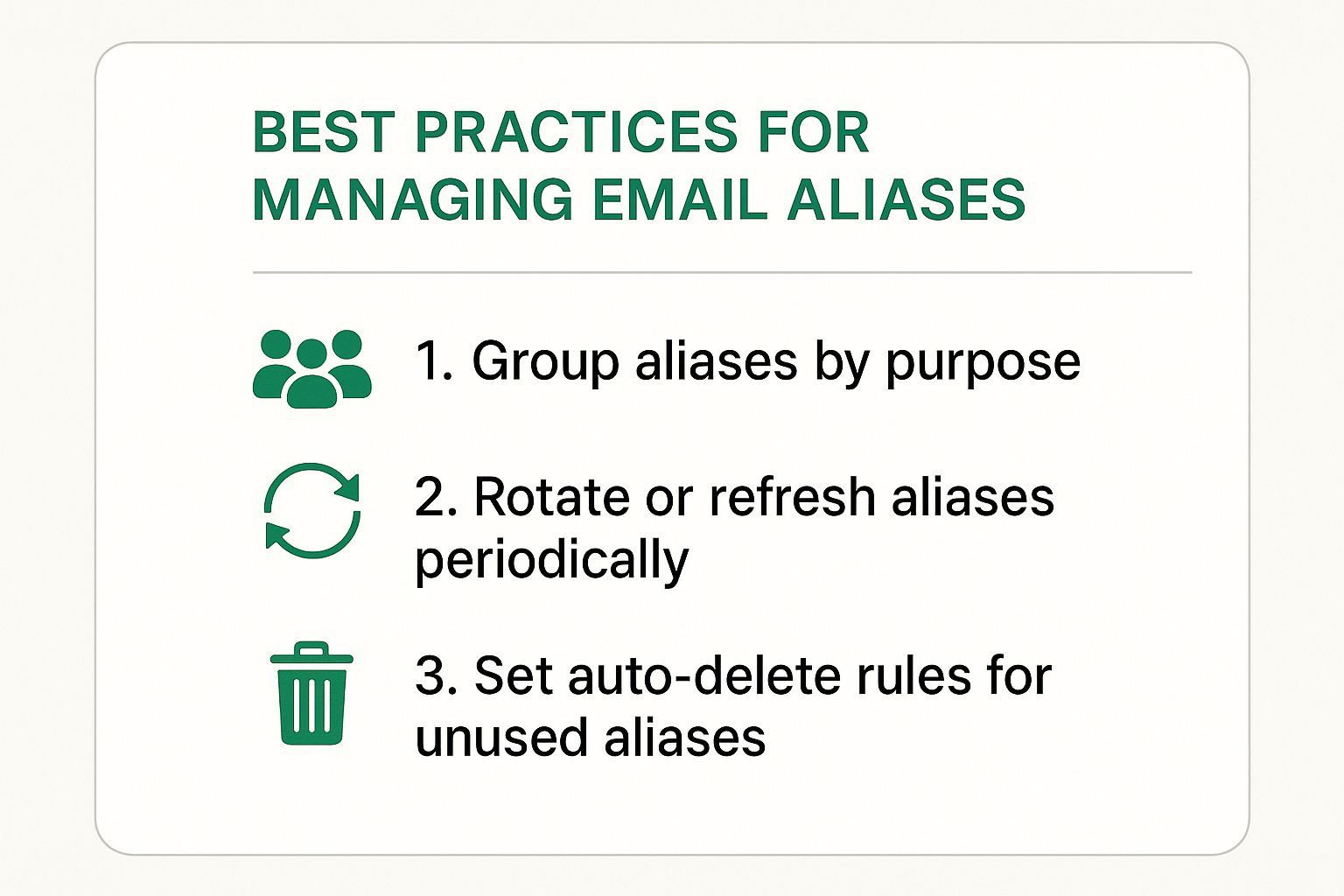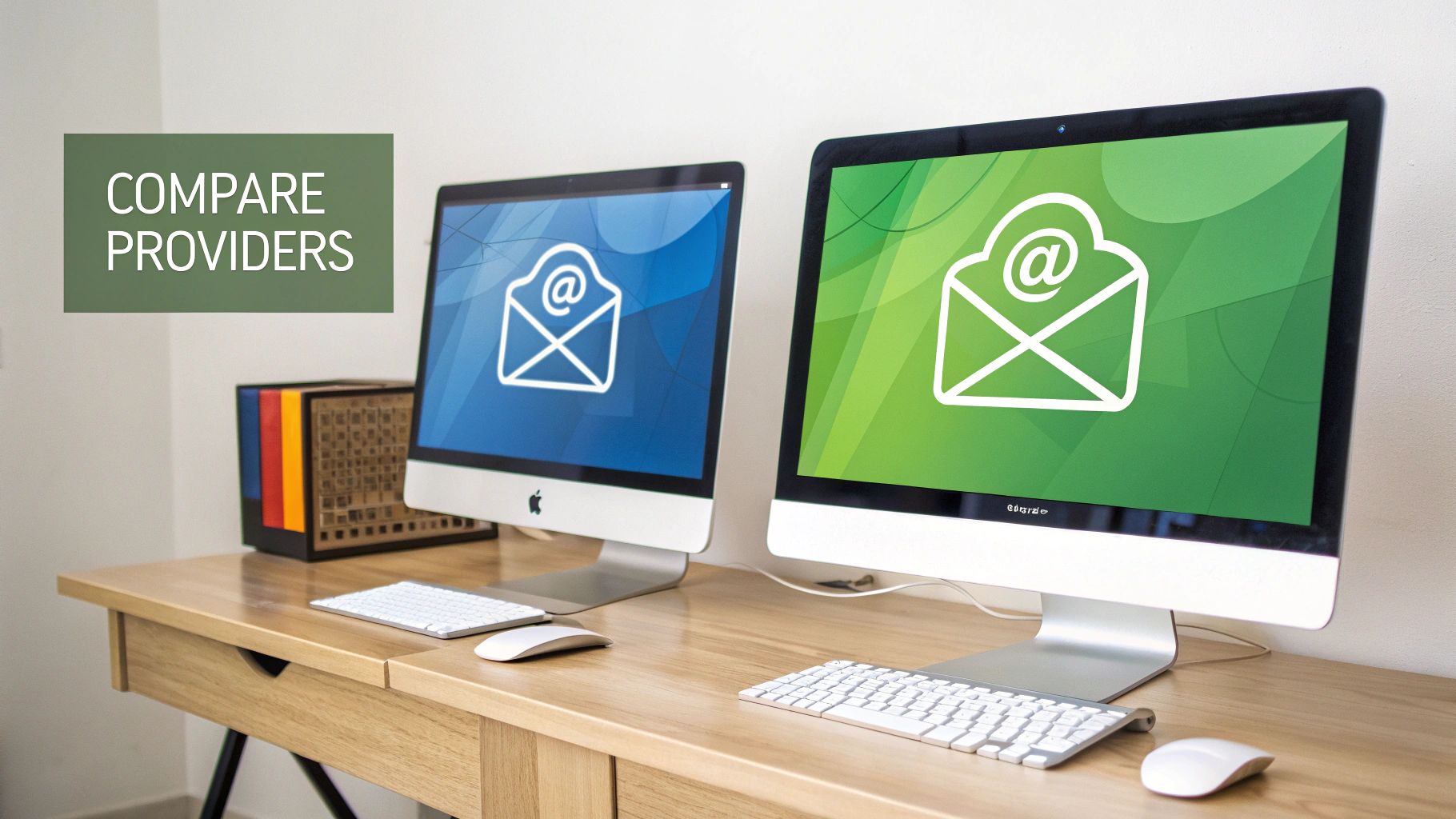The Ultimate Guide to an Email Alias Service

At its core, an email alias service is a privacy tool that lets you create unique, disposable email addresses. These addresses act as middlemen, forwarding any messages they receive straight to your real inbox without ever exposing your primary email address.
It helps to think of it as a digital P.O. box for your online life.
What Is an Email Alias Service and Why Use One
Your primary email address is a lot like your home address. You wouldn't just hand it out to every cashier, online form, or newsletter you come across, right? That would be an open invitation for junk mail, and if that list got into the wrong hands, it would expose a key piece of your identity and link all your activities together. An email alias service provides a powerful buffer against exactly that.
Instead of sharing your real email, you generate a unique, random alias for every new site or service. For a pizza loyalty program, you might use something like pizzanight.zyx@myalias.com. For a new social media account, it could be newnetwork.123@myalias.com. Messages sent to these aliases show up in your main inbox just like any other email, but the sender never learns your actual address.
A Modern Security Essential
This simple layer of separation is surprisingly powerful. We all know data breaches are a constant risk, and our email addresses are prime targets. If a company you used an alias with gets hacked, the only thing that leaks is that one disposable alias.
Your digital identity is made up of a lot of information, and it’s often attached to the personal email address you use all over the internet. Email aliases are a great way to protect your privacy and hide your personal email address and thus your digital identity.
The benefits become clear almost immediately:
- Spam Control: The moment an alias starts getting spam, you know exactly who sold or leaked your information. Better yet, you can just switch off that single alias and the spam stops instantly, without disrupting any of your other accounts.
- Enhanced Privacy: Using random, non-identifying aliases makes it incredibly difficult for data brokers and advertisers to connect the dots and build a detailed profile on you.
- Improved Security: A leaked alias can't be used to reset the password on your bank account or main email, because it’s not the address they have on file. It's a dead end for hackers.
To put it simply, an email alias gives you control. Here’s a quick breakdown of how these services protect you.
| Benefit | How It Works |
|---|---|
| Spam Prevention | When an alias is spammed, you can disable it instantly, cutting off the source without affecting other communications. |
| Leak Identification | Since each alias is unique to a service, you immediately know which company was breached or sold your data. |
| Privacy Protection | By masking your real email, you prevent data brokers from linking your online activities into a single, comprehensive profile. |
| Security Shield | A leaked alias is useless for trying to compromise your critical accounts (like banking) because it's not the real login credential. |
Using an alias is a simple yet effective strategy for taking back control of your digital identity.
Growing Demand for Digital Privacy
While the basic idea of email forwarding has been around for a while, the demand for dedicated privacy services has exploded. The market for these tools, valued at roughly USD 0.16 billion, is expected to nearly double to USD 0.32 billion by 2033.
That’s a projected 8% compound annual growth rate, which sends a clear message: people are actively looking for ways to manage their digital footprint. If you're curious about the numbers, you can review the full market projections to see the trends for yourself.
Ultimately, using an email alias service is a smart, proactive step toward better digital hygiene. It empowers you to decide who gets to contact you, pinpoint the source of data leaks, and keep your real inbox clean and secure.
How Email Aliases Protect Your Digital Identity

Think of an email alias service as your personal gatekeeper for the internet. Every time you sign up for a newsletter, create an account, or download a freebie, you're handing over a small piece of your identity. With an alias, you're not giving out your real address; you're providing a unique, disposable stand-in. This simple step creates a crucial buffer between your true identity and the countless websites that want your data.
That buffer is a lifesaver when a company inevitably gets hacked. Data breaches have become a fact of life, and millions of email addresses are exposed every year. If a service you used an alias for gets breached, only that specific, disposable alias is compromised. Your real email address—the one connected to your bank, your work, and your family—stays completely untouched and out of harm's way.
Pinpoint Leaks and Shut Down Spam
Here's where using email aliases gets really powerful. By creating a unique alias for every single service, you build an incredibly effective diagnostic tool for your inbox. It gives you a level of clarity you just can't get otherwise.
Let’s say you create a few different aliases for your online activities:
pizzadeals-24@myalias.comfor that local pizza place's loyalty club.fashionsale-19@myalias.comfor a one-time purchase from a new clothing brand.techupdates-03@myalias.comfor a tech blog's newsletter.
Suddenly, you start getting weird spam emails sent to fashionsale-19@myalias.com. You know with 100% certainty where the leak came from. The clothing store either sold your data or had a security breach. There’s no guesswork involved.
“Most people have one primary email address that becomes their internet identity. [Creating] email aliases on the fly adds a line of privacy defense to online accounts.” – Son Nguyen Kim, Founder and CEO of SimpleLogin
Armed with that knowledge, your next move is simple. You just log into your alias provider and switch off that one address. Just like that, the spam stops. The compromised alias becomes completely useless to shady marketers and scammers. This kind of surgical control is simply impossible when you use one email for everything.
Compartmentalize Your Digital Life
Using a unique alias for each service effectively compartmentalizes your online footprint. This means a security problem with one account doesn't spiral into a full-blown identity crisis. It's the same logic as having different keys for your house, your car, and your office—losing one doesn't mean everything you own is suddenly vulnerable.
This strategy protects much more than just your inbox from spam. Your real email is often the username for your most important accounts, like banking and government portals. Keeping it private is a massive security upgrade. While aliases shield the address itself, it’s also smart to protect the content of your messages. You can define encrypted email and learn how to secure your actual communications in our guide.
At the end of the day, an email alias service is all about taking a proactive stance on your own privacy. It puts the power back in your hands, letting you build a more resilient and private digital life, one alias at a time.
Key Features of a Great Email Alias Service

When you start looking at email alias providers, you'll quickly realize they aren't all created equal. Sure, the basic job is to forward emails, but the best services give you a whole toolkit for control, security, and real-world convenience. It’s about choosing a service that genuinely shields your digital life, not just one that pulls a thin curtain over it.
The absolute baseline feature? The power to create unlimited aliases. Your privacy shouldn't come with a quota. A top-notch service will let you spin up a new, unique alias for every single website, app, or newsletter you sign up for. This is what lets you instantly identify which company got breached or sold your data when spam starts hitting a specific address.
Of course, creating aliases is only half the battle. You also need one-click management. The moment an alias gets compromised and starts flooding you with junk, you need a quick way to shut it down. The best providers offer a simple dashboard or browser extension to turn off any alias with a single click, cutting off the spam at its source.
Core Functionality and Control
Once you get past the fundamentals, the real power lies in the advanced options. A truly great email alias service should be flexible enough for both personal organization and professional use cases.
- Custom Domain Support: This is a game-changer for freelancers, consultants, or small business owners. It lets you create aliases using your own domain (like
billing@mycompany.comornewsletter@mycompany.com), so you look professional while keeping all your communications neatly separated. - Two-Factor Authentication (2FA): Any service that holds the keys to your email needs to be locked down tight. Strong 2FA isn't just a nice-to-have; it's a mandatory security layer to keep anyone from getting into your alias dashboard and causing chaos.
- Intuitive User Interface (UI): If a tool is clunky and confusing, you simply won't use it. Look for a clean, straightforward interface that makes creating, labeling, and deleting aliases feel effortless, not like a chore.
These features are what elevate an alias service from a simple forwarder to a true command center for your online identity.
Deliverability and Privacy Policies
An alias is completely pointless if important emails don't get to you. High email deliverability is a crucial feature that often gets overlooked. You have to be confident that critical messages, like a password reset link or an order confirmation, will reliably land in your real inbox. While some providers struggle, a recent report on email deliverability statistics shows that the best services are consistently getting better at this.
A transparent privacy policy is the bedrock of trust. If a service's policy is vague about logging, tracking, or selling your information, walk away. The entire point of using an alias is to increase your privacy, not just swap one data tracker for another.
Ultimately, a quality alias provider is just one piece of your overall privacy puzzle. To see how it fits into the bigger picture, take a look at our roundup of the best email for privacy options on the market today. If you keep these key features in mind, you can find a service that delivers real, meaningful protection.
Alright, you've got the essentials down—what an email alias is, why it's a game-changer for your privacy, and what features make a service worthwhile. Now for the fun part: picking the right one.
The market for an email alias service has really blown up, and it's not a one-size-fits-all situation. Different services are built for different people. To figure out which one is your perfect match, let's stop thinking about a dry list of features and start thinking about what you actually need to do.
What’s your main reason for using an alias? Are you a hardcore privacy advocate who wants to lock down every digital door? Maybe you're a freelancer or small business owner trying to look professional without juggling a dozen different email accounts. Or, like most of us, you just want solid, everyday protection without a lot of fuss. Your answer points you directly to the right kind of provider.
Finding the Right Fit for You
Let's break it down by who these services are really built for. This approach helps cut through the marketing jargon and gets you to the features that will genuinely make your life easier.
-
For the Privacy Purist: If your top priority is security, you'll want a service with a rock-solid, transparent privacy policy. Look for providers that are open-source and lean heavily into strong encryption. These services often trade flashy features for bulletproof security.
-
For the Small Business or Freelancer: The absolute must-have feature here is custom domain support. This is what lets you create professional aliases like
sales@yourbusiness.comorprojects@yourfreelancename.comthat all funnel neatly into a single inbox you already use. It keeps you organized and reinforces your brand. -
For the Everyday User: The sweet spot is usually a service that's simple to use and offers a generous free plan or an affordable subscription. You’re looking for something that lets you spin up new aliases in seconds, manage them easily, and just works.
Here’s a pro tip from someone who’s managed hundreds of aliases: get organized from day one. I like to create categories like "Shopping," "Social Media," and "Newsletters." It makes it incredibly easy to see where your email is coming from and instantly shut down a specific alias if it starts getting spammed.
The image below gives you a quick visual on how to keep your aliases from turning into a chaotic mess.

As you can see, a little bit of organization—grouping your aliases, rotating them for sensitive sign-ups, and deleting ones you no longer need—goes a long way in keeping your digital life clean and secure.
To give you a clearer picture, here’s a table comparing some of the top players in the game, categorized by the user profiles we just discussed.
And remember, while aliases protect your email address, they don't necessarily protect the contents of your emails. For that next layer of security, you might want to check out our guide to the top 10 best encrypted email services for privacy in 2025.
Email Alias Service Feature Comparison
This table offers a quick, side-by-side look at how some popular providers stack up for different needs.
| Provider | Best For | Alias Limit | Custom Domain | Price Model |
|---|---|---|---|---|
| SimpleLogin | Privacy Purists | Unlimited (Paid) | Yes (Paid) | Freemium |
| AnonAddy | Value & Open Source | Unlimited (Paid) | Yes (Paid) | Freemium |
| DuckDuckGo Email | Simplicity & Tracking Protection | Unlimited | No | Free |
Ultimately, the "best" service is the one that fits seamlessly into your workflow. Whether you choose the robust privacy of SimpleLogin, the open-source flexibility of AnonAddy, or the dead-simple tracker blocking of DuckDuckGo Email Protection, you're taking a massive step toward reclaiming your inbox.
Making an Alias Service Part of Your Daily Routine

A powerful privacy tool is only useful if you actually use it. The real goal is to weave an alias service so seamlessly into your online habits that it becomes second nature. Honestly, the easiest way to get started is to install your provider's browser extension.
This tiny addition makes privacy the default. When you land on a sign-up form, the extension pops up, ready to generate a unique, random alias with a single click. It completely removes the friction and the temptation to fall back on your real email address. You don't have to think, create, or remember anything—the tool does it all for you.
Build a Self-Organizing Inbox
Okay, so you’ve got aliases forwarding mail to your primary inbox. What now? The next step is to manage the flow so you don't end up with a chaotic mess. A simple system of filters and labels can transform that potential chaos into a perfectly organized, self-sorting archive.
Here’s a practical way to set it up:
- Create Your Labels: Start by making a few labels for the kinds of emails you get, like
Shopping,Newsletters, orSocial Media. - Set Up Filters: Now, create a filter for each alias. Tell your email client that any message sent to
pizzadeals@myalias.comshould automatically get theShoppinglabel. - Automate the Actions: You can even take it a step further. Have the filter automatically archive promotional emails, so they skip your main inbox but are still saved if you need them later. Your inbox stays clean, and you stay organized.
By creating email addresses with no identifying information, you make it harder for data brokers to learn anything about you or collect your data. Aliases are an essential tool in the fight for digital privacy, and we believe everyone should be using them.
This kind of organization is incredibly powerful, especially with how email has evolved. The rise of alias services has gone hand-in-hand with the dominance of clients like Gmail. It’s no coincidence; Gmail's user base has exploded by nearly 60% in the last decade, largely because its powerful features, like advanced filtering, are a perfect match for an alias strategy. You can discover more about Gmail's growth and features to see just how well these platforms support a more private, organized digital life.
Advanced Uses for Everyday Life
Once you get the hang of it, you'll find uses for aliases everywhere. Freelancers I know create a unique alias for each client. It keeps all project communication separate and looks incredibly professional. If you're running a side hustle or a personal project, a dedicated alias gives you a distinct channel without the hassle or cost of a whole new email account.
The real magic happens when using aliases becomes an automatic, effortless habit. It’s about building a digital lifestyle where privacy isn’t an afterthought—it's just how you do things.
Common Misconceptions About Email Aliases
Like any powerful privacy tool, a few myths have cropped up around email alias services. It's easy to misunderstand how they work, so let's clear the air and separate fact from fiction.
The biggest mix-up is confusing a true alias service with the "plus addressing" feature you find in Gmail or Outlook. You know the trick: adding a + sign to your address, like myemail+pizzadeals@gmail.com, to create a filter.
While that's handy for organizing your inbox, it does next to nothing for your privacy. Your real email address is still sitting right there in plain sight, completely exposed. Any marketer or data scraper can easily strip away the +pizzadeals part and add your core address to their list.
A real alias service, on the other hand, creates a truly separate, unique email address that acts as a solid wall between a service and your actual inbox. If that alias ever gets spammed or leaked, you just delete it. The trail goes cold right there, and your personal inbox remains untouched.
Aren't Aliases Just for Shady Activities?
This is a common one, but it gets the purpose of aliases completely wrong. The idea that you only need an alias if you're doing something sketchy online is like saying you only lock your doors if you're a spy.
In reality, using an alias is just good digital hygiene. It's the online equivalent of shredding your sensitive mail instead of tossing it in the public recycling bin. You're taking a simple, proactive step to shield your identity from the endless barrage of data breaches, spam campaigns, and invasive data brokers.
“By creating email addresses with no identifying information, you make it harder for data brokers to learn anything about you or collect your data. Aliases are an essential tool in the fight for digital privacy, and we believe everyone should be using them.”
Are They the Same as 10-Minute Emails?
Finally, people often lump alias services in with those temporary, "10-minute email" sites. While they might seem similar at first glance, they're built for entirely different jobs.
-
Temporary Emails: Think of these as disposable paper cups. They’re perfect for a quick, one-time use, like signing up for a resource you'll never need to access again. After a few minutes, they're gone for good.
-
Email Aliases: These are more like permanent, unlisted phone numbers. They're designed for long-term use. You can receive and even reply to emails through them, maintaining a private connection with an online account for as long as you need. This makes an email alias service the right tool for managing all your online accounts without exposing your true identity.
Got Questions About Email Aliases? We’ve Got Answers.
Even after you get the hang of how email aliases work, a few practical questions always seem to pop up. Let's tackle some of the most common ones you might have as you start using them.
Can I Actually Reply From an Alias?
Yes, and this is where the magic really happens. Any decent alias service is built for two-way conversations.
When an email gets forwarded to your main inbox and you hit "reply," the service is smart enough to intercept it. It then sends your message back out from the alias address. To the person on the other end, it looks like a normal email conversation, and your real email address stays completely hidden the entire time.
This is a game-changer for things like dealing with online sellers, signing up for newsletters, or managing freelance projects without giving away your personal email.
The ability to send and receive makes an alias feel less like a simple forwarder and more like a fully functional, disposable email address. It’s an active tool for communication, not just a passive shield.
Is Using an Email Alias Service Even Legal?
Of course. Using an email alias to protect your privacy is 100% legal. In fact, security experts actively recommend it.
Think of it like getting a P.O. Box. You use it to keep your home address private and avoid a mailbox stuffed with junk mail. An email alias does the exact same thing for your digital life. These are legitimate privacy tools designed to help you fight back against spam, data brokers, and the endless wave of data breaches.
What Happens If I Cancel My Subscription?
This is a really important question, and the answer depends entirely on the provider. You absolutely need to read their policy on this before you sign up, because the experience can be drastically different.
Here are the common scenarios:
- Your Aliases Die Immediately: Some services will shut down your aliases the second your subscription ends. Any email sent to them will bounce, and you could lose access to whatever accounts are tied to them.
- You're Moved to a Free Plan: A friendlier approach is downgrading your account to a free tier. You might be able to keep a few aliases active, but with new limits on how many you can have or how much traffic they can handle.
Knowing the exit plan ahead of time is crucial. It ensures you don't get locked out of important accounts if you ever decide to switch to a different service down the road.
Ready to take control of your inbox with a secure, private email solution? Typewire offers robust email hosting with advanced anti-spam filters, custom domain support, and a commitment to zero tracking. Explore our powerful features and start your 7-day free trial today.
The Ultimate Guide to an Email Alias Service
Posted: 2025-08-01
Professional Email Greeting: Master the professional email greeting today
Posted: 2026-02-10
What is Email Phishing: Securing Your Inbox Against Digital Fraud
Posted: 2026-02-06
10 Email Retention Policy Best Practices for Security and Privacy in 2026
Posted: 2026-02-03
Top 12 Secure Alternatives to Gmail for Privacy in 2026
Posted: 2026-01-31
What Is Email Alias: A Guide to Better Email Security and Privacy
Posted: 2026-01-27
How to Send an Encrypted Email and Protect Your Digital Privacy
Posted: 2026-01-23
Email Hosting Canada The Definitive Guide to Privacy and Security
Posted: 2026-01-20
How to Send Email Securely: A Guide to Real Privacy & Security
Posted: 2026-01-16